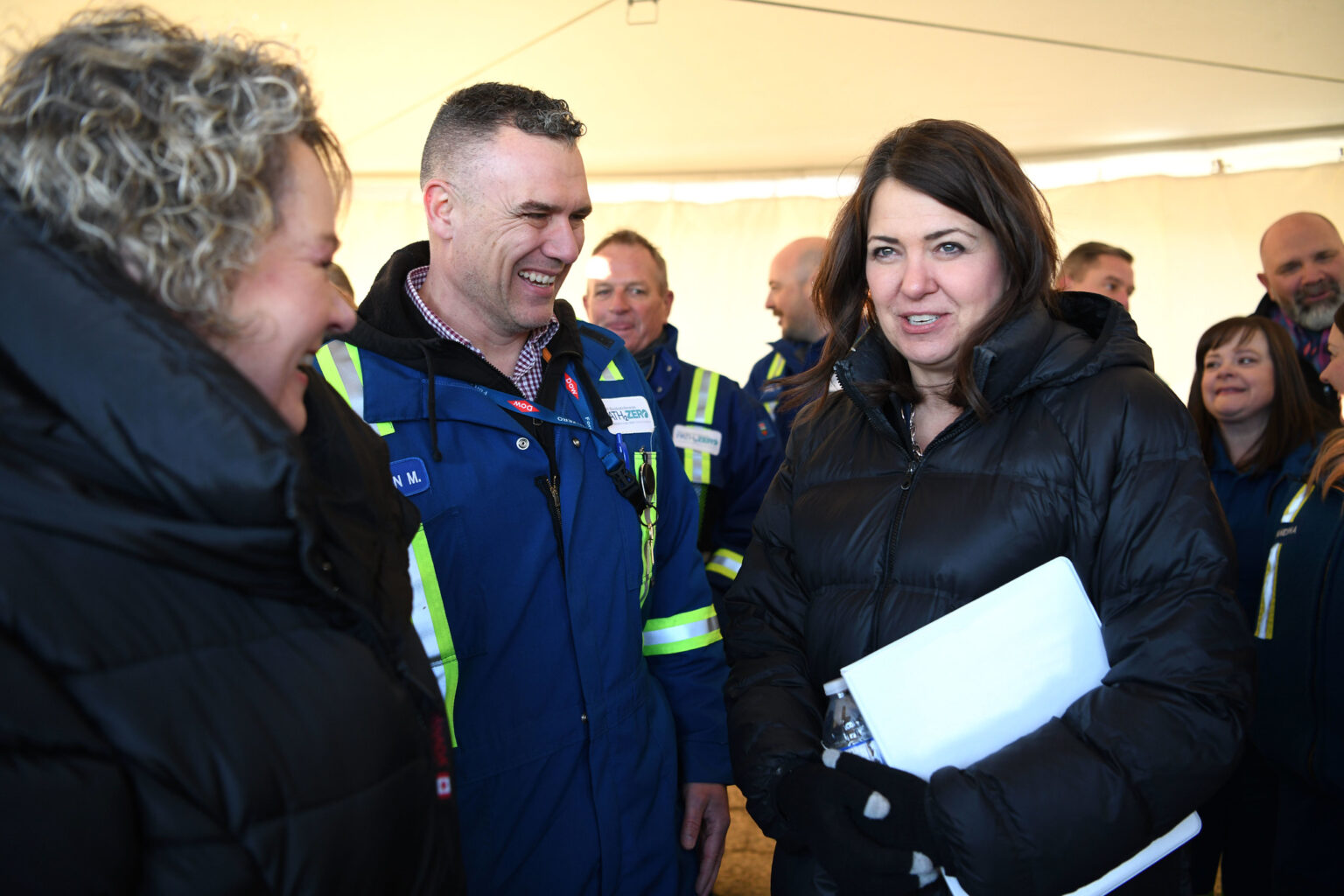A major cold snap led to record electricity usage in the Canadian province of Alberta over the weekend, culminating in demands from provincial utilities to limit consumption. The extreme cold and record-setting electrical consumption has reignited local debates about whether heat pumps are a viable option in the province.
While Canada’s federal government is interested in helping Canadians transition off oil and gas for home heating — and is incentivizing the installation of heat pumps — Alberta Premier Danielle Smith has repeatedly warned against them.
The premier has made the same comment — that heat pumps don’t work well in cold temperatures and that homeowners can’t get insurance without having a backup heating source — on at least two separate occasions in recent months.
Smith’s comments were made in the context of home heating costs within a wider discussion concerning carbon taxes and the affordability crisis.
Canadian Prime Minister Justin Trudeau announced a three-year “carbon price carve out” for home heating oil in October 2023. Roughly one-third of residents in Canada’s Atlantic provinces heat their homes with home heating oil. As such, premiers from other provinces, as well as opposition party leaders, called the measure unfair. Trudeau won strong support from Canada’s Atlantic provinces during the 2015 election, but that support has steadily eroded in recent years.
The measure doesn’t uniquely benefit Canadians from the Atlantic provinces, however, as home heating oil is also the predominant home heating source for lower income Canadians and Canadians living in rural areas across the country.
Use of heat pumps as the primary home heating system is growing across Canada, though use is far more prevalent in Eastern Canada than the rest of the country, with the Atlantic provinces leading above all others. The province of New Brunswick leads the nation, with 32 percent of homes heated with heat pumps. Nationally, the figure is only 7 percent, though this is more than twice as many as was reported a decade ago.
While interest in heat pumps and their use is trending upwards — an encouraging sign given their utility in curbing emissions — according to analysis by the Canadian Climate Institute, year over year growth in the total number of homes heated with heat pumps has been sluggish, at only 1.6 percent annually from 2013 to 2020. The institute argues that growth will have to increase substantially if Canada seeks to hit 2030 emissions reductions targets.
Concurrent with the announcement on home heating oil, Trudeau also announced plans to work with provincial governments to subsidize the installation of heat pumps for low income residents nationwide.
Despite this, various provincial premiers indicated they would take action against the federal government if it went ahead with the planned carbon price carve out. The most extreme reaction was from Saskatchewan Premier Scott Moe. In November, he instructed his province’s public utilities, SaskPower and SaskEnergy, to stop collecting carbon taxes on natural gas as of January 1, 2024, if the federal government didn’t extend the same carbon price carve out to his province. Moe stayed true to his word, and the provincial utilities stopped collecting the tax at the beginning of the year despite the fact that doing so is illegal. Though Premier Moe has argued his decision will save Saskatchewan families about $400 per year, analysts and economists counter that most people in Saskatchewan will actually lose out, because most Canadians get carbon tax rebate cheques. This same point was made by federal government representatives who indicated roughly 80 percent of that population already receive more money back in carbon rebates than what they pay.
During an October 2023 episode of CTV News’ Power Play, host Vassy Kapelos asked Danielle Smith if she agreed that the heat pump rebate would be a benefit to Albertans living in rural areas of the province.
“As I understand it, you can’t get insurance on a heat pump system anywhere that goes below minus 20 degrees Celsius, you have to have a backup. We are routinely below 20 degrees Celsius in our province in winter. Heat pumps are not the solution,” Smith responded.
Smith then segued into attacking Trudeau’s carbon tax, which she claimed went “too far, too fast,” and which she insinuated “no one could afford.” Fighting carbon taxes at both the provincial and federal level is a de facto policy of conservative parties throughout Canada. Alberta in fact introduced an economy-wide carbon tax in 2015, the same year Justin Trudeau was first elected prime minister. One of Trudeau’s campaign promises was to enforce a federal carbon tax on any province that didn’t already have one, a measure that went into effect in 2016. Alberta’s carbon tax program began in 2017 but was repealed in 2019 by former premier Jason Kenney, Smith’s predecessor.
In addition to erring about the details of when and how carbon taxes were introduced in Alberta, Smith made several misleading statements regarding heat pumps.
“No need for people to get rid of their furnaces. Heat pumps can act as a supplement to save money and GHGs.”
Brendan Haley, director of policy research with Efficiency Canada
To begin with, heat pumps are indeed an energy efficient and low-cost way to both heat and cool homes. A recent study by the Canadian Climate Institute reveals that heat pumps can be between two and five times more efficient than gas furnaces. The institute compared different housing types in five cities across Canada — Vancouver, Edmonton, Toronto, Montreal, and Halifax — representing several distinct regions and climates. While the modeling indicated gas heating and air conditioning, or heat pumps with gas back-up were currently the cheaper option in Edmonton, this is conditional on currently low gas prices available in Alberta. If electricity prices in Alberta come down in the future, heat pumps will be the cheapest option there too.
The belief that heat pumps are inefficient in cold climates seems to be a holdover from an era when the technology was less sophisticated. A recent study by Consumer Reports indicates that commercially available heat pumps, if well-chosen and properly-installed, can provide highly effective and efficient home heating even in extreme cold weather.
As to whether heat pumps would be effective in cold climates such as Alberta, Premier Smith might consider that Scandinavian countries are world leaders in the use of heat pumps. Norway, a nation that can certainly claim to be one of the world’s most frigid, has the highest market penetration of heat pumps globally. Sixty out of every one hundred homes in Norway heats with a heat pump. Sweden and Finland are also world leaders in heat pump use. In Canada, Ontario, Quebec, and British Columbia lead in heat pump use. Winter temperatures of negative twenty Celsius are common in all of these jurisdictions.
Anecdotal evidence from Alberta’s most recent extreme cold snap indicate that while heat pumps might not have been the optimal home heating choice on the coldest of days, they have been more than adequate throughout nearly the entirety of the rest of the winter so far. One news report from the past weekend, where temperatures hit -40 Celsius, indicated that electric vehicles and heat pumps were not operating as well as they normally would. That said, less expensive heat pump models are known to be less capable at home heating in extreme cold temperatures, while more expensive models are better suited to handling extreme cold. There were no reports of widespread heat pump failures in Alberta.
Premiers who support the fossil fuel industry were quick to exploit the emergency for the apparent political advantage. Saskatchewan premier Scott Moe took to social media to announce his province was supplying Alberta with additional electricity, which he proudly boasted was coming from coal and gas sources. Alberta, Canada’s sunniest and windiest province, issued a moratorium on new solar and wind power projects last year.
SaskPower is providing 153 MW of electricity to AB this evening to assist them through this shortage.
— Scott Moe (@PremierScottMoe) January 14, 2024
That power will be coming from natural gas and coal-fired plants, the ones the Trudeau government is telling us to shut down (which we won’t). pic.twitter.com/DxdBl8i03V
As to whether homes heated with heat pumps can’t be insured, as Smith alleged, Sam Blackett, the premier’s press secretary, pointed to a 2022 Canadian Broadcasting Corporation news story from the Atlantic province of New Brunswick. The report quotes the province’s consumer advocate for insurance, Michèle Pelletier, who stated simply that New Brunswick consumers should check with their home insurers in case the latter insists — as some do — on having a backup heat source for the home.
There are in fact no universal Canadian guidelines pertaining to home insurance and heat pumps. In most jurisdictions, the advice is simply to check with the insurer to see what their individual policies are. As Global News recently reported, having a backup heating source is only a recommendation as some models have a reduced heating capacity at temperatures below minus 30 degrees. That said, as a recent New York Times article explains, even during periods of extreme cold, an electric heat pump is still more energy efficient at heating a home than either a gas or oil furnace.
The benefit of the heat pump is not only its energy efficiency or that it can be used to both heat and cool homes, but most significantly that it can be used to replace burning fossil fuels for home heating. According to the Canadian Climate Institute, heat pump energy efficiency is substantial, often using 70 percent less energy than conventional heating technologies. Transitioning to heat pumps as the primary method for home heating in regions in which the majority use either fuel oil or natural gas would therefore result in a considerable drop in energy demand and carbon dioxide emissions. Stanford University climate scientist Mark Z. Jacobson has determined that heat pumps would play an integral role in the transition to full wind, water, and solar power electrification (along with electric vehicles, electrifying industry, and the elimination of energy consumption related to the mining, transportation, and refining of fuels). By his estimate, upon electrification of all energy and providing the energy from clean, renewable sources, total end-use energy demand in Canada would drop by 62 percent, with heat pumps accounting for 14 percent.
A recent study published in the journal Energy Policy by researcher Theresa Pistochini, co-director of engineering at the UC Davis Energy Efficiency Institute and Western Cooling Efficiency Center, indicates that heat pumps can reduce carbon dioxide emissions by 38 to 53 percent over a gas furnace. Moreover, the study indicates that emissions reductions were highest in two American regions — the Pacific and Northeast — where climatic conditions are similar to those in Canada.
Brendan Haley, director of policy research with Efficiency Canada, also believes that heat pumps, along with building envelope improvements, are a sensible way to reduce greenhouse gas emissions. “In a place like Alberta those improvements will help lower emissions and bills immediately, not to mention significantly reduce the electricity grid impacts of heat pumps,” an important consideration in a province still amply powered by fossil fuels.
“There is also no need for people to get rid of their furnaces. Heat pumps can act as a supplement to save money and GHGs, while also providing air conditioning, when used at the right time.”
Subscribe to our newsletter
Stay up to date with DeSmog news and alerts







